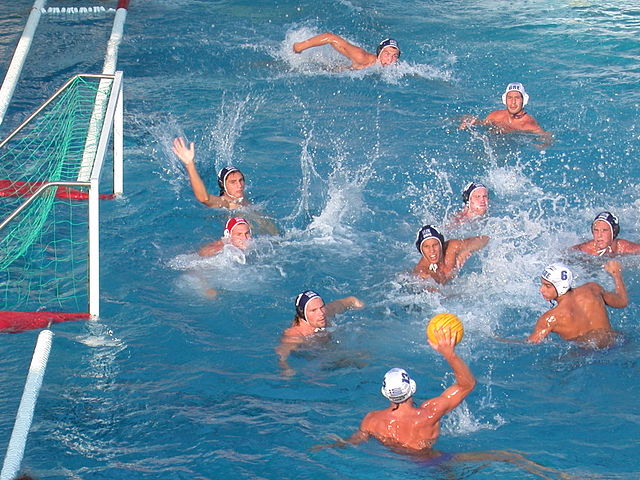Water polo is a dynamic and physically demanding team sport played in a swimming pool. Players combine swimming, passing, shooting, and defensive skills to outscore their opponents. Here are five essential skills every water polo player must develop:
1. Swimming Proficiency:
- Endurance: Water polo players need excellent swimming endurance to cover the length of the pool repeatedly during the game. Regular swim training, including distance swims and interval sprints, contributes to enhanced endurance.
 Speed: Speed is crucial for both offensive and defensive plays. Players should work on sprinting and quick directional changes to outpace opponents.
Speed: Speed is crucial for both offensive and defensive plays. Players should work on sprinting and quick directional changes to outpace opponents.- Underwater Speed and Maneuvering: The ability to swim efficiently underwater is a key skill. Players use underwater swimming to gain a tactical advantage, evade defenders, and position themselves for shots or defensive plays.
2. Ball Handling and Passing:
- Ball Control: Water polo players must master ball handling, including dribbling, catching, and securing the ball in various situations. This skill is fundamental for maintaining possession and executing offensive plays.
- Passing Accuracy: Precise passing is crucial for effective team play. Players need to develop accurate passes to set up scoring opportunities and maintain the flow of the game. Different passing techniques, such as wrist passes and overhead passes, should be practiced.
- Shooting Skills: Scoring in water polo requires strong shooting skills. Players should practice various shooting techniques, including quick releases, power shots, and accurate placement.
3. Defensive Techniques:
- Body Positioning: Defensive players need to maintain proper body positioning to block shots, disrupt passes, and impede opponents. This involves treading water effectively while staying in close proximity to the offensive player.
- Stealing and Intercepting: Developing the ability to steal the ball from opponents or intercept passes is a valuable defensive skill. Quick reflexes, anticipation, and hand-eye coordination play a role in successful steals.
- Goalkeeper Skills: Goalkeepers require specialized skills, including quick reactions, lateral movement, and shot-blocking ability. Goalkeepers must also communicate effectively with teammates to coordinate defensive strategies.
4. Tactical Understanding:
- Game Awareness: Water polo is a dynamic sport with constantly changing scenarios. Players need to be aware of their surroundings, anticipate opponents’ moves, and make quick decisions based on the flow of the game.
- Positional Play: Understanding and executing different positions and roles on the team contribute to effective gameplay. This includes knowing when to attack, defend, and transition between offensive and defensive roles.
5. Teamwork and Communication:
- Communication: Effective communication is vital for coordinating plays, signaling intentions, and ensuring everyone is on the same page. Players should use hand signals, verbal cues, and non-verbal communication to convey information.
- Team Coordination: Water polo is a team sport, and successful teams rely on coordinated efforts. Players should understand their teammates’ playing styles, strengths, and preferences to enhance teamwork.
Additional Tips:
- Fitness Training: Water polo demands a high level of overall fitness. Players should engage in cardiovascular conditioning, strength training, and agility drills to meet the physical demands of the sport.
- Eggbeater Kick: Mastering the eggbeater kick is essential for maintaining an upright position in the water, allowing players to tread water efficiently while using their hands for ball handling or defensive actions.
- Rule Knowledge: Understanding the rules of water polo is crucial for fair play. Players should be aware of fouls, penalties, and game regulations.
- Mental Toughness: Water polo can be physically and mentally challenging. Developing mental toughness helps players stay focused, resilient, and composed in high-pressure situations.
By consistently honing these skills through practice, training, and match experience, water polo players can contribute effectively to their team’s success and enjoy the dynamic nature of the sport.



 Speed: Speed is crucial for both
Speed: Speed is crucial for both 







